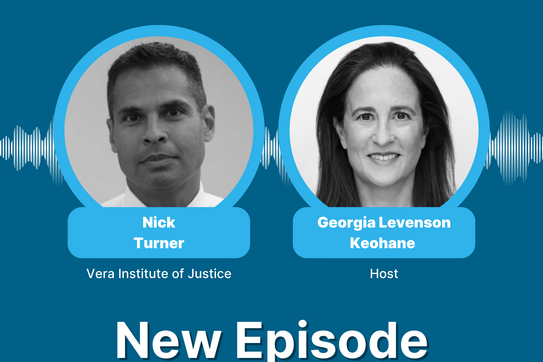In this episode of Capital for Good we speak with Nick Turner, the president and director of the Vera Institute of Justice, where he has spearheaded the organization’s work over the last decade to end overcriminalization and mass incarceration in the United States. Turner is one of the nation’s most visible and important leaders on criminal legal reform – and on a broader set of equity and justice issues.
We begin with some of the formative experiences that would shape Turner’s lifelong commitment to justice, fairness, and understanding “how things work — or don’t work — for people.” The son of Black and Filipina parents, Turner grew up in Washington, DC, attended a Quaker school with a deep service ethos — and would return to Washington after college to work with court-involved, homeless, and disconnected young people at Sasha Bruce Youthwork, a youth services organization. After Sasha Bruce, Turner says he could never “unsee” the glaring underinvestment in that community and in the potential of its young people — and would go on to pursue a career focused on the structural changes necessary to address these inequities.
We discuss the complex issue of mass incarceration; the politics of fear that drive excessive policing, charging, and sentencing; the criminalization of poverty; and the deeply racial disparities and underpinnings of a legal and carceral system that would grow 700 percent between 1972 and 2009, when 2.5 million people in the United States were behind bars and half of all American families have had an immediate family member incarcerated. Turner reminds us, and the data show, that incarceration in the United States is often counterproductive. The severe disruptions and trauma that come with time behind bars can lead to a vicious cycle of instability, poverty, crime, and reincarceration. Although we have made significant progress — the number of people incarcerated is down 25 percent from 2009 — we find ourselves again in a moment when fears about crime and public safety have dampened support for important and evidenced-based criminal justice reforms.
In addition to some of the better known and proven reforms (i.e., those related to bail and sentencing), Turner describes alternatives to conventional policing and incarceration — responding to mental health, housing, or substance use crises with trained specialists instead of police, community violence intervention programs — that reduce crime, deliver safety and accountability, and help shrink the jail and prison populations. We also touch on important rehabilitative efforts to improve conditions behind bars (such as education and restorative housing pilots) and ways the private sector — through changes to hiring and housing policies — can improve opportunities for people to be successful once they are released.
Turner notes that despite the polarizing politics of public safety, most Americans are now “smarter” about the harmful costs of mass incarceration — younger generations particularly so — and support change. “It is possible to have public safety and justice,” he says. “People want safety, they also want solutions.”
Mentioned in this episode:
- Ending Mass Incarceration, (Vera Institute of Justice)
- The Prison Paradox: More Incarceration Will Not Make Us Safer, (Vera Institute of Justice)
- Nearly Half of Americans Have Had a Family Member Jailed, Imprisoned, (Cornell University, 2019)
